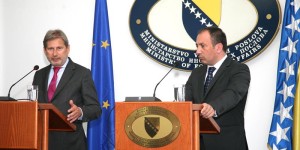Your Excellency, ladies and gentlemen, media representatives.
It is a pleasure to be here today on the occasion of opening the project “Strengthening the National Planning Process in
Polls show regularly that economic growth and jobs are considered the most important issues by the population. Proper planning is an essential tool to deliver this. Put very simply, it is the tool which will translate the broad objectives which politicians commit to into strategies and actions which then create the framework to get investments and therefore jobs.
Let us take as an example some of the objectives that Bosnia and Herzegovina has undertaken to meet. In 2011 the Western Balkan countries have underwritten the South East European 2020 Vision, which called for the consistent implementation of economic reforms to foster integrated, smart, sustainable and inclusive growth underpinned by good governance and the rule of law.
Looking more specifically then at inclusive growth. How doe we move from a vision to reality? Through skills development, employment creation and labor market participation by all, including vulnerable groups and minorities
And how do we know if we succeeded in meeting this goal? The objective needs to be assessed as met if measurable results are achieved. In this particular case the countries of the region undertook in November 2012 to increase the overall employment rate by 12% and to add 300,000 highly educated people to the region’s workforce by 2020.
At this stage the policy planning process moves into the relevant countries to see how they can contribute to this goal in a coordinated fashion. And within each country the policy planning moves into a greater level of detail on how skills can be developed, jobs created and greater participation by women in the job market promoted.
What this implies is: development of strategies setting out the broader elements which need to be achieved and action plans which concretely translate them into results through for example relevant new legislation or particular infrastructure projects. This of course requires the collection of reliable statistcs to make informed decisions and actions relevant, as well as a linkage to the budgetary planning process to make sure they can be financed. It requires a coherent methodology to make sure that the planning is developed in an effective fashion.
And in the context of the complex constitutional structure of BiH, it requires that the countrywide planning in BiH is based on a modular approach which takes place through several processes and institutions on state, entity and Brcko District (BD) levels, as well as cantonal level in FBH.
This project will work with the main actors in the strategic economic development planning process. This includes the Directorate for Economic Planning (DEP), responsible for establishing the coordination mechanism across all levels of BiH governments. The main partners of the DEP in the coordination of preparation of the strategic documents at the entity level are the Federal Institute for Development Programming of FBH, the Department for Coordination of Capital Investments and Development of the Ministry for Economic Planning and Regional Cooperation of RS, and the Section for European Integration and Coordination of BD. Key institutions at the state level are the Directorate for European Integration (DEI), the Public Administration Reform Coordinator Office (PARCO), the Ministry for Foreign Trade and Economic Relations, and the BiH Ministry of Finance and Treasury.
In short, for the project, establishing cooperation with these bodies and strengthening cooperation among them will be of essential importance.
Indeed the project puts an emphasis on developing an integrated approach, which will link the implementation of strategies with BiH’s core policy and financial planning processes. By establishing this link, the project will also support policy-making at all levels of government, as well as public finance reform.
This project is commencing in right time as the preparations for IPA II are already taking place. Indeed we want to see how our future assistance fits into sectoral strategies which set out coherent objectives and actions in a specific area such as transport or the environment. Experience and knowledge of your colleagues from Austria and Slovenia can help you by providing you with methodologies and tools for strategic planning.
Policy planning is not merely something to be done to pave the way to European integration. This would be a misleading approach. Good policy planning has the potential of strengthening the economy to achieve smart, sustainable and inclusive growth in its own right. Or to put it differently, to meet the concerns of citizens by laying the tracks to increase jobs, levels of education, achieve better health services, make Bosnia and Herzegovina a more attractive place for investments.
I would like to thank you for your attention and wish you all successful project implementation.



